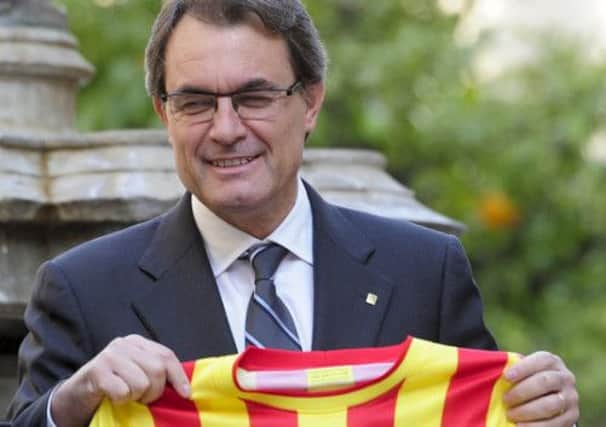Spain: No Catalonia independence referendum plans


Instead, he proposes that the elections scheduled for 2016 should be seen as a plebiscite on the region’s future constitutional status.
The announcement seems certain to produce a rift with Mr Mas’ informal coalition partner Esquerra Republicana, which has explicitly made its support conditional on a 2014 referendum. The chances of the incumbent Madrid government giving its blessing to a referendum on independence are practically nil.
Advertisement
Hide AdAdvertisement
Hide AdOriol Junqueras, the ERC leader, said in a Tweet following Mr Mas’ announcement: “We have to decide our future in 2014 and we will do everything in our power to ensure that happens. Independence the sooner the better.”
The party’s deputy general secretary Lluís Salvado insisted that “the referendum will be held in 2014 come what may”. Asked if this meant an end to ERC’s pact with Mas’ ruling CiU party, Mr Salvado said paradoxically that “not by any means does this mean there is a crisis in our relationship. The coalition is in good health.”
Mr Mas, a lukewarm separatist who prefers the word “sovereignty” to “independence”, has always sought shelter in the law and the constitution, which outlaws referendums but not “consultations”.
Nevertheless, he said, “do it in such a way that the State doesn’t make it difficult,” referring to the “plebiscite election” he proposes for 2016.
Last year he promised that if elected he would hold a referendum with or without Madrid’s approval.
Were ERC to desert him Mr Mas would be forced to either stumble on in a minority government or seek an alliance with the socialists, who have little to gain from such a pact, or with Spain’s ruling Partido Popular, which would be disastrous in the current political climate. The last thing Mr Mas wants to do is call an early election, having called a snap poll only last November. That too was billed as a plebiscite on the single issue of Catalan sovereignty. He lost ten seats and a large slice of the vote went to a resurgent Esquerra.
Since then the groundswell of pro-independence sentiment has continued to grow, although polls still suggest that nearly half the population is either indifferent or opposed.
Mr Mas’s Convergència i Unió party’s ambivalence about independence has eroded its previously strong base, while the number saying they would vote for ERC at the next election is increasing. Pere Navarro, leader of the Catalan socialist party, dismissed talk of a plebiscite election as “a publicity campaign” designed to divert attention away from the government’s economic policy and “to create more tension”.
Advertisement
Hide AdAdvertisement
Hide AdHe said that the Catalan people need solutions to today’s problems and not promises of some “future paradise”.
During the radio interview yesterday Mr Mas said that by postponing the referendum it would be possible to hold elections in better economic circumstances and without spending cuts and when advances had been made in areas such as transparency.